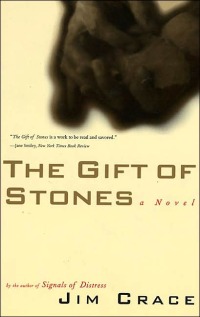The Gift of Stones by Jim Crace
 Thursday, November 4, 2010 at 10:02AM
Thursday, November 4, 2010 at 10:02AM 
First published in 1988
The Gift of Stones tells a story that works on both a micro and a macro level. It is the story of civilization making the transition from the Stone Age to the Bronze Age as seen from the perspective of a few individuals living in a small village of stoneworkers. The villagers are skilled craftsmen; they live comparatively well, trading carefully-fashioning tools and arrowheads for food and other goods furnished by farmers and hunters. They don't know that their way of living is coming to an end.
When a horseman shoots a boy with an arrow, causing the boy to lose his arm, he cannot work as a stoneworker and so becomes a storyteller. His stories are inspired by what he has seen a day’s walk from the village, including a woman and daughter who live by the sea. The woman whores herself and lives meagerly until the spring when geese arrive and provide a feast of eggs and goose meat. The boy takes an interest in them that they don't entirely welcome. When events force them to choose between moving or starving, however, the woman and daughter accompany the boy to the village. Having no skills, their lives continues to be difficult despite the help the boy tries to provide. As a storyteller, he represents the conscience of the village, but most of the villagers have little use for a conscience.
Late in the novel, a tragedy occurs that involves a bronze arrowhead. The arrowhead heralds the coming of the Bronze Age and the end of village life -- the villagers recognize that bronze is superior to stone and that their skills will no longer serve them. The storyteller is the only villager whose career cannot be supplanted by new discoveries or technologies: he continues to act as a guide for those who are willing to listen.
The Gift of Stones is a parable, a lesson in the enduring role of the artist in a society that inevitably changes. The novel can also be read as a comment on the natural bonding of societies (in this case, the village of craftsmen) and their intolerance of outsiders. But The Gift of Stones is also a moving story of individuals confronting forces that they are powerless to affect. Crace's elegant prose reminds us of what it is to be human, even in the context of the distant past. The story is simple but powerful and Crace tells it so gracefully that the novel is a joy to read.
HIGHLY RECOMMENDED
 TChris |
TChris |  Post a Comment |
Post a Comment |  HR,
HR,  Jim Crace in
Jim Crace in  General Fiction
General Fiction
Reader Comments